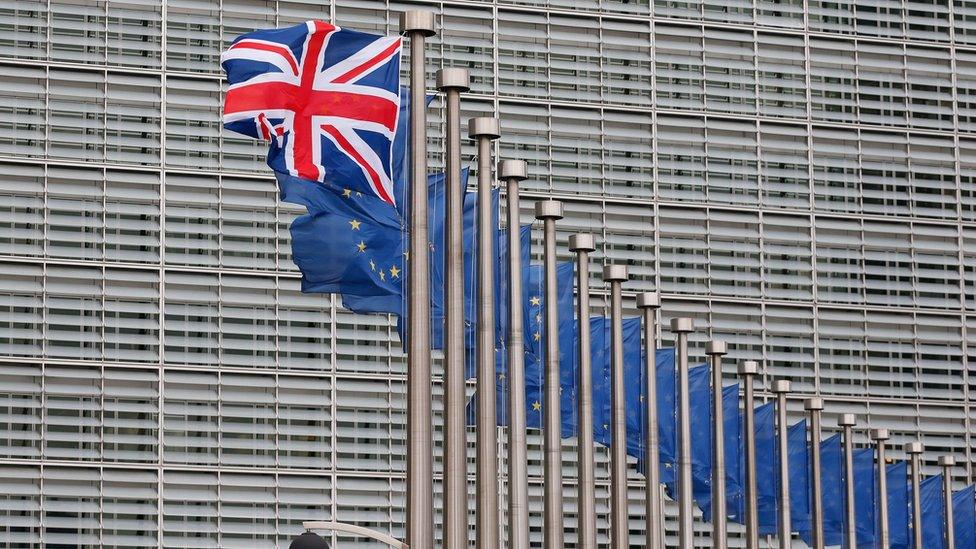EU Referendum: What happens to jobs and growth funding?
- Published

The Eden Project received European Union funding.
Billions of pounds of EU funding has been earmarked for projects to create jobs and growth across England over the coming years. Now the UK is heading for the exit, what happens next?
BBC News looks at the numbers.
How much is involved?
The UK government says over the past nine years, EU investment has helped almost 25,000 businesses, external to start and created 115,000 jobs.
The EU allocated €6.2bn (currently worth about £5.2bn) to England between 2014 and 2020 under the European Regional Development Fund (ERDF) and European Social Fund (ESF). This was money from the EU's budget to which the UK had contributed.
The latest tranche of money was divided up by the former Coalition government to boards known as Local Enterprise Partnerships (LEPs), which bring together local authorities and business leaders.
Some areas with greater need received a larger share per head of population than others.
For example, in Cornwall and the Isles of Scilly the funding was worth £1,070 per person over seven years, by far the biggest share. In Buckinghamshire and Thames Valley, it was just £26 per person.
The former received more because they are the only part of England whose economic performance was below 75% of the EU average, external. Previous funding rounds included £26m towards the costs of building The Eden Project, external.
How did areas with most funding vote?
Cornwall voted out. And now its council leader has called for that money to be guaranteed by the government.
And when the vote is broken down by LEP area, rather than by region, the five that received the most funding per head of population all voted Leave. However, four of the five areas that received the least funding per person voted to stay in.
What happens now?
Assurances are being sought that the money from the EU will be replaced by the UK government. Sandra Rothwell, chief executive of the Cornwall and Isles of Scilly LEP, said: "The UK is still part of Europe and [we] still have an EU programme worth some £500m to 2020.
"We will be working to ensure that this doesn't change for at least two years while the terms of the UK's exit are negotiated and existing treaties remain in place.
"Whatever the detailed outcome of those negotiations, it is critical that Cornwall and the Isles of Scilly continues to receive the same level of investment and is not short changed as a result of the referendum result."
Isn't it UK taxpayers' money anyway?
Leave campaigners would say yes, although those who campaigned for Remain say the overall economic benefits of access to the single market far exceed what the UK pays in.
Nine days before the referendum, 13 Government ministers and senior Conservatives said recipients of funding would continue to get it after a Leave vote. However, they were speaking as Leave campaigners rather than as the government.
In the letter, external they say: "There is more than enough money to ensure that those who now get funding from the EU - including universities, scientists, family farmers, regional funds, cultural organisations and others - will continue to do so while also ensuring that we save money that can be spent on our priorities."
The Local Government Association, which represents councils, still wants confirmation from the government. It warned that local economies would be "stifled" if the funding was withdrawn.
The latest finalised figures for the EU budget were for 2014. They showed the UK contributed £14.4bn that year, after its £4.4bn rebate was taken into account (the rebate money is never actually sent to the EU).
It then received back a further £4.6bn in grants and other funding.
This includes grants paid to farmers to make the farming and forestry industries more competitive.
What are the funds used for?
A lot of funding is earmarked for projects that support jobs and growth. Projects aim to boost broadband coverage, support businesses, reduce climate change, and improve employment opportunities.
For example, in Greater Manchester, a grant from the ERDF offers support through a Business Growth Hub, which gives advice and training to access finance, improve skills and productivity.
There are 32 separate funds across England currently open for applications for support from the European Structural Investment Fund, which includes ESF and ERDF. Of those, 13 do not close to bidders until some time in 2017. Many of them are aimed at small and medium enterprises (SMEs)
For the next two years, it will be business as usual. Manchester Growth Company, a group of businesses working to improve the local economy, expect to see little change for the time being.
Mark Hughes, its chief executive, said: "The majority of our EU funding is committed for the next two to three years and this therefore means there will be little to no immediate change and we will continue in our work of delivering growth, jobs and prosperity.
"The public have made the decision to leave the EU and we will now work with government to find solutions to continue to serve the people of Greater Manchester."
- Published25 June 2016
